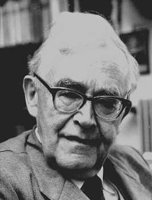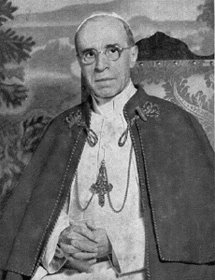

It is said that Pope Pius XII once described Karl Barth as the most important theologian since St. Thomas Aquinas. I have no idea in what context he made this remark, or even if he ever really said it. The Pope's description of Barth is referred to so often in print that there must be some element of truth in it. I like to believe it is true, whatever the case, and not just because I'm a great admirer of Barth, which of course I am. Rather it is because Barth not only set the bar extremely high for later theologians (no serious theologian can avoid dealing with Barth), but because his theology is at heart and source eminently Catholic. Of course I don't mean "Roman," though Barth has had many admirers in that camp, among them Hans Küng and Hans Urs von Balthasar.
My first exposure to Barth was in seminary, where my instructors encouraged my classmates and I mostly to avoid him for fear of our souls. That wasn't a hard sell at the time, because Barth makes for notoriously tedious reading. So it's not surprising that I would come to know him more intimately much later on, towards the end of my formal education (I'm ashamed to admit), and at first through his interpreters. Scholars like T.F. Torrance, G.C. Berkouwer, and G. Bromiley come primarily to mind. I sat up and first took notice at Bromiley. I wondered to myself, "Why would an Anglican like Bromiley be interested in Barth?" And then there was Balthasar, a Roman Catholic theologian. A critic? Yes, but more an admirer than a critic.
More recently I have become familiar with the work of George Hunsinger of Princeton University, no doubt the leading Barth scholar today. Hunsinger's How to Read Karl Barth is one of those rare books that I've actually read cover-to-cover not once, not twice, but three times. While I would describe Bromiley's work with terms such as "objective," "accurate" and "concise," the only term that comes close to a fair description of Hunsinger's Barth studies is "empathetic."
Reading Barth with understanding, nay, rather, reading him with empathy for the first time is to theology what looking through Galileo's telescope at the moons of Jupiter must have been for those who first dared do so in the 17th century: revolutionary (no pun intended, though certainly appropriate).
The most important theologian since Aquinas? No question about it.
I will continue my thoughts later. For now, good night!

4 comments:
Well said, my friend!
Barth is among the best pilgrims to have on the journey.
Dave,
Your remarks are right on with regard to Barth in comparison to Aquinas. Very well put! I don't quite concur with the characterization of Barth's thought as "Fideism," though I'm aware that this is a common criticism of those who have studied him more than I. Be that as it may, Barth is nowhere near being above reproach.
Your question supposes that the Aquinas quote assumes a fundamental methodological affinity between the two giants. That's not the case. Rather, the affinity between the two thinkers lies in their comparable importance and lasting contribution to theology in general - i.e., the fact that the world has not seen a comparable intellectual "giant" since St. Thomas Aquinas. (Incidentally, I wouldn't be at all surprised to discover that, after getting over his embarassment, Barth was annoyed that Calvin had been slighted.)
Thanks for your comments.
Dan
P.S. Goobynelly, I see from your profile that you have Hunsinger's book as one of your favs too!
Found your blog through a search for 'Berkouwer'. I wondered if you might be interested in a blog I've recently set up. It's concerned with 'The Theology of G C Berkouwer' - www.theologyofgcberkouwer.blogspot.com I am the author of a book on Berkouwer - 'The Problem of Polarization: An Approach based on the Writings of G C Berkouwer'.
A second - .com comes after blogspot I missed that out first time!
Post a Comment